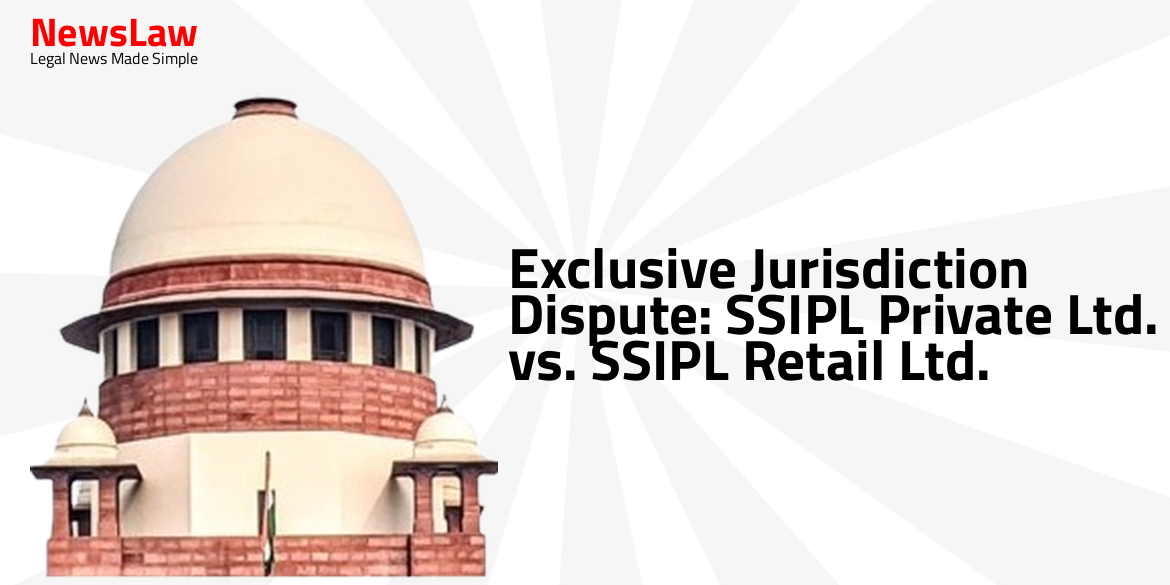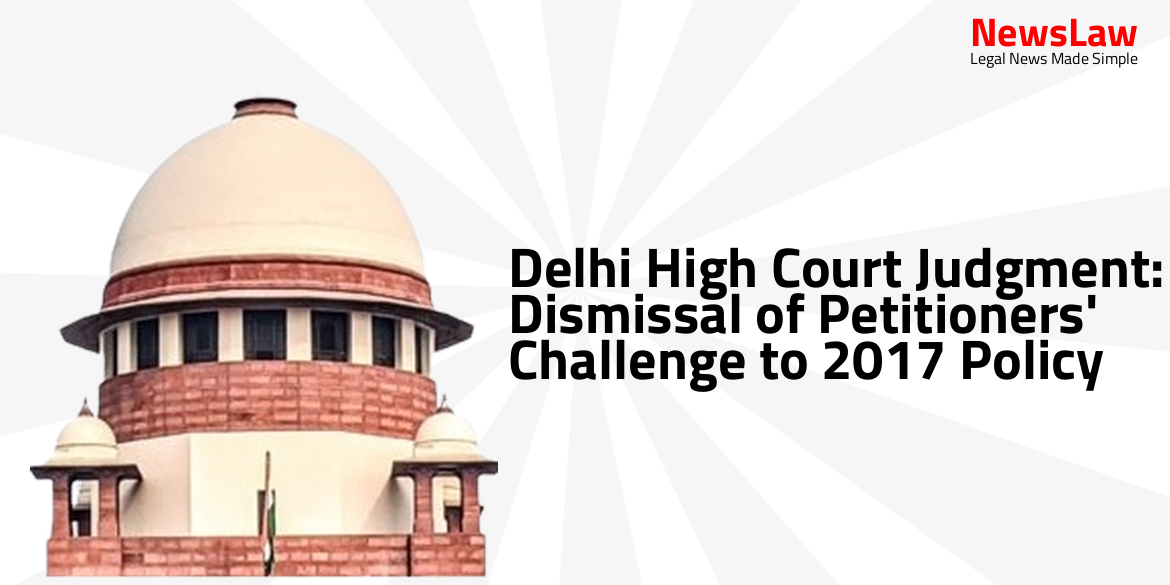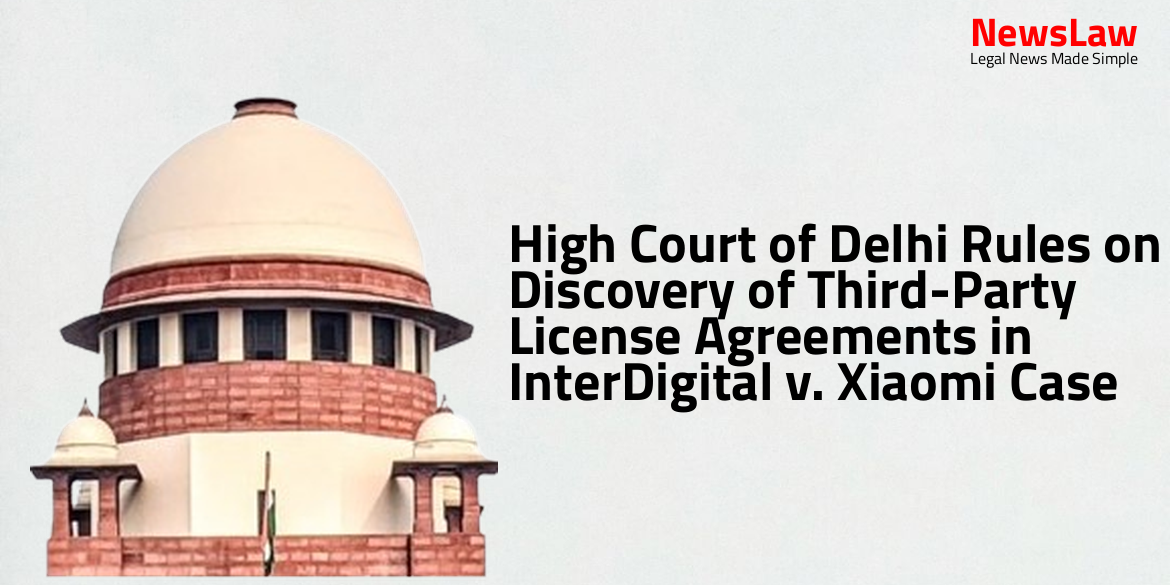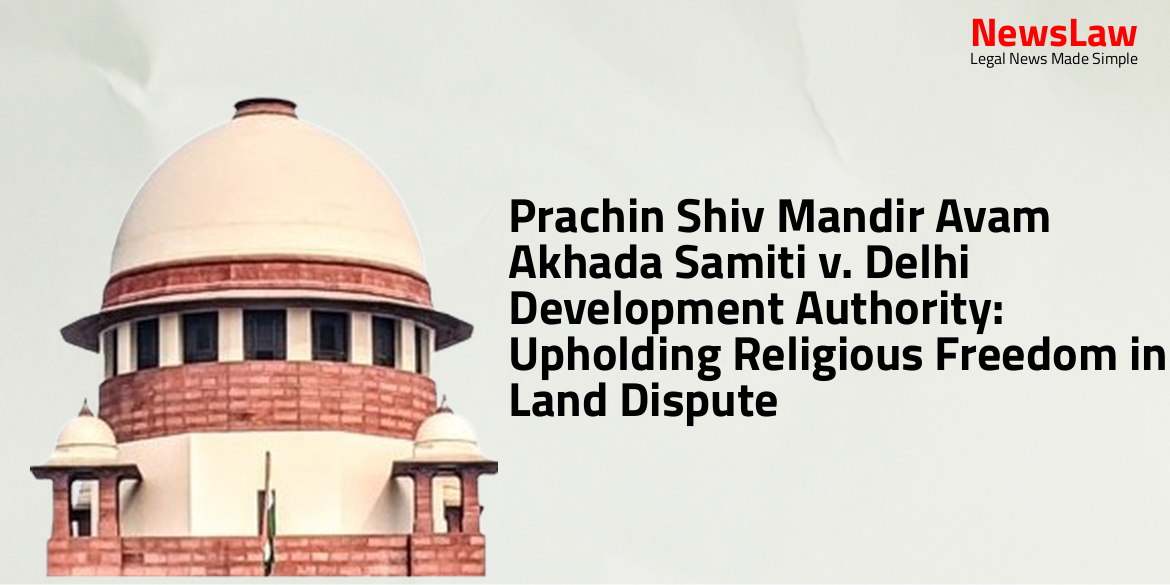A significant legal dispute regarding exclusive jurisdiction arose between SSIPL Private Ltd. and SSIPL Retail Ltd. The case delved into the intricacies of jurisdiction clauses in contracts, leading to a judgment by the Delhi High Court. Learn more about the implications of this ruling in our detailed summary.
Facts
- Two suits were filed on 17.02.2018 by SSIPL Private Ltd. and SSIPL Retail Ltd. seeking recovery towards outstanding invoices, refund of security deposits, and losses and damages caused.
- The defendants seek the return of the suit for want of territorial jurisdiction based on an agreement dated 22.04.2016, which exclusively provided for the Jurisdiction of Mumbai Courts.
- The suits were for the recovery of Rs. 2,17,31,781/- and Rs. 3,38,73866/- along with interest, based on agreements entered into for the supply of products under various brand names, for sale from Vama Department Store in Mumbai.
- Defendants raised a preliminary challenge to the jurisdiction of the court and requested the return of the plaints under CPC, 1908 Rule 10, with a direction to present them to the court of requisite jurisdiction in Mumbai.
- Issues between the parties arose regarding payment of outstanding dues, leading VAMA to issue a notice dated 21.08.2017 seeking refunds of the outstanding amounts.
Issue
- Resolution of conflict between jurisdiction clause in subsequently generated Invoices and exclusive jurisdiction clause in the Agreement dated 22.04.2016.
- Determining whether the jurisdiction clause in the Invoices supersedes Clause 32 (Mumbai) of the Agreement.
- Examining the legal implications of conflicting jurisdiction clauses in contractual documents.
- Evaluating the impact of such conflict on the resolution of disputes between the parties involved.
Arguments
- The plaintiff has pleaded that the Court has territorial jurisdiction based on various grounds.
- The defendants have failed to file the Written Statement and their right to do so has been struck off.
- Defendants filed Applications under Section 8 of the Arbitration and Conciliation Act, invoking territorial jurisdiction.
- The Exclusive Jurisdiction Clause in the original Agreement stands novated.
- The disputes are deemed non-arbitrable as per Court’s observation.
- Claims of the plaintiff are argued to be non-arbitrable and within the jurisdiction of this Court due to novated Understanding.
- Defendants argue that the Agreement dated 22.04.2016 was not rescinded, thus Delhi Court lacks territorial jurisdiction.
- Plaintiff’s registered office in Delhi does not confer jurisdiction as main business is in Mumbai as per Invoices.
- Defendants claim Mumbai Courts have exclusive jurisdiction based on contract execution and acts in Mumbai.
- Legal precedents are cited to support the argument for exclusive jurisdiction of Mumbai Courts.
- The claims of the plaintiff do not pertain to the Contract dated 22.04.2016
- The Contract has been terminated
- Jurisdiction for the maintainability of the Suits depends on where the cause of action has arisen
- Jurisdiction is also mentioned in the Invoices on which the claims of the plaintiff are based
- The Court has territorial jurisdiction for this case
- The application is without merit and liable to be dismissed
Analysis
- Defendant No 2 accepted and acknowledged misrepresentations, rendering the Addendum and Agreement dated 22.04.2016 legally voidable.
- Parties novated the Agreement and arrived at a fresh preliminary understanding/arrangement in July 2016 operationalized in September 2016.
- Agreed terms under the novated understanding: done away with minimum guarantee amount, reduced product sales linked payment arrangement, no lock-in/assured payment, terminable at convenience.
- Exclusive jurisdiction clause in the Contract specified Mumbai Courts for disputes, upheld by judicial pronouncements.
- Unilateral addition of jurisdiction clause without mutual confirmation deemed ineffective due to lack of consensus ad idem.
- Exception to exclusive jurisdiction clause: oppressive or causing inconvenience to parties, practicality where evidence and witnesses located in different jurisdiction.
- Novation of Contract did not repeal entire original Agreement dated 22.04.2016, only certain clauses were partially novated.
- Jurisdiction clauses on Invoices not binding if not explicitly agreed upon inter se the parties in the main Contract.
- Jurisdiction determined by nature of case, pecuniary value, territorial limitation, and cause of action under CPC, 1908.
- Recognition of four exceptions to exclusive jurisdiction clause: ignorance of clauses, unilateral insertion, practicality, incompetence of agreed court.
- Original Contract stood partially novated, parties continued business under original terms of Agreement dated 22.04.2016.
- Arbitration proceedings and jurisdiction both specified to be at Mumbai Courts reinforcing Mumbai’s exclusive jurisdiction.
- Exclusive Jurisdiction Clauses are often included in contracts to limit legal proceedings to one place and forum for convenience and to avoid confusion.
- Section 28 of the Indian Contract Act, 1872, makes agreements in restraint of legal proceedings void.
- The validity of Exclusive Jurisdiction Clauses was settled in the case of Hakam Singh vs M/s. Gammon (India) Ltd. , 1971 (1) SCC 286.
- Parties cannot confer jurisdiction to a court that is not competent as per the provisions of the CPC, 1908.
- Agreements limiting jurisdiction to one court when multiple courts have jurisdiction are not in violation of Section 28 of ICA, 1872 or public policy.
- The case of Globe Transport Corpn. vs Triveni Engg. Works, (1983) 4 SCC 707, upheld the validity of a jurisdiction-limiting clause.
- In A.B.C. Laminart (P) Ltd. vs A.P. Agencies, (1989) 2 SCC 163, clarity and specificity in an exclusionary clause make it binding on parties.
- The use of words like ‘alone’, ‘only’, ‘exclusive’ indicate limiting jurisdiction to one court.
- The principle of expression unius est exclusio alterius can be applied to infer exclusion of other courts when one is specified in a contract.
- In R.S.D.V. Finance Co. (P) Ltd. vs Shree Vallabh Glass Works Ltd. , (1993) 2 SCC 130, the Apex Court reaffirmed the validity of exclusive forum agreements when clearly spelled out.
- In the case of Secretary Vikalanga Sevaka vs. Sheth, emphasis was placed on the presence of ‘consensus ad idem’ of the parties when conferring, ousting, or limiting the jurisdiction of Courts.
- A suit was filed in Calicut based on payments made through RTGS into the plaintiff’s bank account at IDBI Bank Park Street Branch.
- It was noted that for a clause in a printed form to be valid, it should be signed by both parties or confirmed in some way by both parties.
- The case of United India vs Associated Transport highlighted that printed words alone in an ouster clause were insufficient to bind the parties unless there was further affirmation by both parties.
- The Calcutta High Court, in the case of Shridhar Vyapaar Private Limited vs Gammon India Limited, emphasized the primacy of the parties’ intention to exclude the jurisdiction of other Courts and confer exclusive jurisdiction on a particular Court.
- The Court held that with an expressly agreed exclusive jurisdiction clause, only Raipur and Nagpur Courts had exclusive jurisdiction, rendering the suit filed at Calicut lacking territorial jurisdiction.
- It was cautioned that particular care was needed when determining jurisdiction issues involving clauses contained in printed forms.
- Exclusive jurisdiction Clause 32 in the Contract is valid and binding, reflecting the intent of the parties.
- The terms printed on Invoices unilaterally generated do not alter the agreed exclusive jurisdiction clause.
- Mere signatures on Invoices by agents of the parties do not imply consensus to modify the contract terms.
- Court lacks territorial jurisdiction to entertain the present suits due to the exclusive jurisdiction clause.
- The plaintiff’s case does not fall within the exceptions mentioned in the Shridhar Vyapaar Private Limited case.
Decision
- The court lacks territorial jurisdiction to decide on the applications
- Applications are dismissed with liberty to file afresh in the court of competent jurisdiction
- Suits are directed to be returned to be presented in the court of competent jurisdiction
- Applications are to be returned to the plaintiff to be filed in the court of appropriate jurisdiction
Case Title: SSIPL RETAIL LIMITED Vs. VAMA APPARELS (INDIA) PRIVATE LIMITED & ANR. (2024:DHC:4140)
Case Number: CS(COMM)-736/2018



